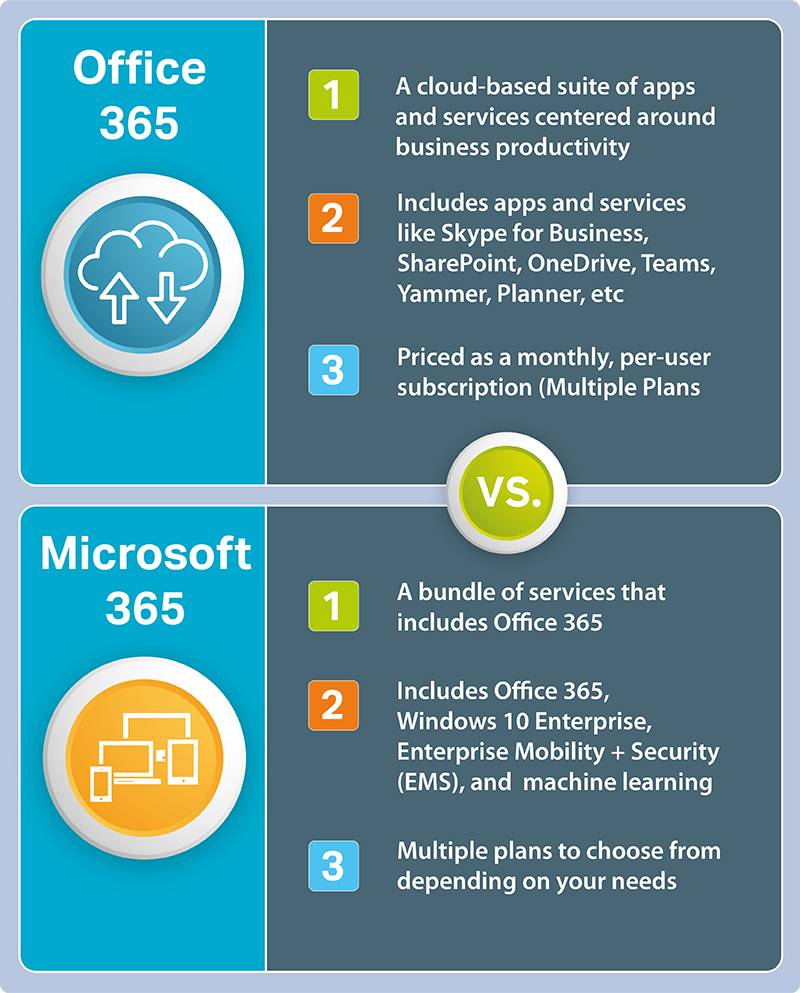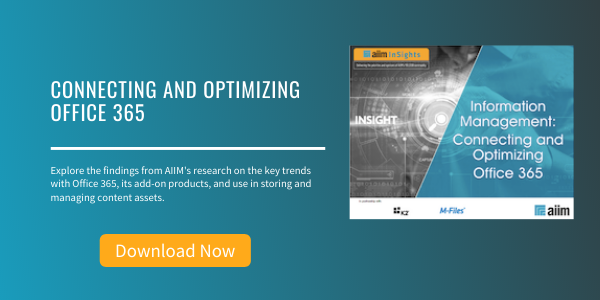
Microsoft 365 vs. Office 365 - Getting the Terminology Right
In last week's article, we talked about the changing role of M365 within organizations, how it is
governed, and how it connects with other content management solutions. Given its rapid evolution and adoption – particularly with the maturation of Office 365 and Cloud versions of SharePoint, we probably should have made a few points about brand terminology. With similar names, "Microsoft 365" and "Office 365" are sometimes used synonymously by users. They are actually different. What's the difference? Let's take a look:
The confusion may have started in 2017 with Microsoft's release of Microsoft 365. This new offering bundled a group of their existing products under one license. One of the products included in the bundle is Office 365...you can see where terminology confusion set in. Let's clear things up with the infographic below:

- Office 365:
- A cloud-based suite of apps and services centered around business productivity
- Includes apps and services like Skype for Business, SharePoint, OneDrive, Teams, Yammer, Planner, etc
- Priced as a monthly, per-user subscription (Multiple Plans)
- Microsoft 365
- A bundle of services that includes Office 365
- Includes Office 365, Windows 10 Enterprise, Enterprise Mobility + Security (EMS), and machine learning
- Multiple plans to choose from depending on your needs
What is Office 365?
Office 365 is a cloud services platform that offers Microsoft products like Word, Excel, PowerPoint, and OneDrive, along with other productivity services like Microsoft Teams, either online or on-premises via a subscription plan.
What is Microsoft 365?
Microsoft 365 is an all-in-one bundle that includes the Office 365 suite, Windows 10 Pro, and Enterprise Mobility+Security for a complete, interconnected experience. The enterprise version of Microsoft 365 is designed for organizations that need a single platform to share and collaborate without risk, which offers data security built on top of Windows 10 Pro and Office 365.
On April 21, 2020, the consumer and small business plans of Office 365 were renamed Microsoft 365, which emphasizes productivity features and services outside of the core Microsoft Office software suite. The Office 365 brand remains in use for plans catered towards enterprise markets, and as a term for the rolling release version of the Microsoft Office software that is distributed as part of the services.
I hope this helps to understand the Microsoft nomenclature.
About Peggy Winton
With years of program, product, and business development experience, Peggy Winton is responsible for the strategic, technical, and business direction of AIIM. Peggy believes that every organization is on – or should be on – a digital transformation journey. And, at the heart of this journey is the drive toward understanding, anticipating, and redefining internal and external customer experiences. Winton joined AIIM in January, 2002 directly from Computer Sciences Corporation (CSC), where she served as Business Developer and strategist for the Consulting Group. Prior to CSC, Winton was Vice President and Chief Operating Officer for TTM, Inc., an international firm specializing in digital and cooperative marketing programs for tourism development. She earned a Bachelor's degree fromRandolph-Macon Woman's College (now Randolph College) and a Master's degree from the University of Maryland. Winton enjoys a reputation as a persuasive and engaging communicator, cross-functional team leader, and public speaker/author.


